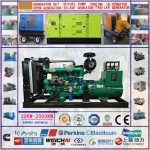Introduction
Electromagnetic compatibility (EMC) testing is a crucial aspect of ensuring that electronic devices operate correctly in their intended environments without causing interference to other devices. To conduct 400kw diesel generator , reliable power sources are required to provide stable and clean power to the test setup. Diesel generators have long been a popular choice for providing power during EMC testing due to their robustness, reliability, and ability to deliver consistent power output. In this article, we will explore the role of diesel generators in EMC testing, their key advantages and considerations, as well as best practices for their use in this critical application.
Overview of EMC Testing
EMC testing is the process of evaluating the electromagnetic emissions and immunity of electronic devices to ensure they comply with regulatory standards and do not interfere with other devices. Emissions testing measures the electromagnetic radiation emitted by a device, while immunity testing assesses the device's ability to operate correctly in the presence of electromagnetic interference.
Types of EMC Testing
There are several types of EMC testing, including radiated emissions testing, conducted emissions testing, radiated immunity testing, and conducted immunity testing. Each type of testing requires specialized equipment and procedures to accurately assess the device's electromagnetic compatibility.
Role of Diesel Generators in EMC Testing
Diesel generators play a critical role in EMC testing by providing a reliable and stable power source to the test setup. During EMC testing, it is essential to have a power source that can deliver consistent power output without fluctuations or interruptions, as any variation in power quality can affect the test results. Diesel generators are well-suited for this task due to their ability to provide continuous power for extended periods and their resilience in challenging operating conditions.
Advantages of Diesel Generators for EMC Testing
There are several key advantages of using diesel generators for EMC testing:

1. Reliability: Diesel generators are known for their reliability and durability, making them ideal for critical applications such as EMC testing where uninterrupted power is essential.
2. Stable Power Output: Diesel generators are capable of delivering stable power output with minimal fluctuations, ensuring consistent test results and accurate measurements.
3. Fuel Efficiency: Diesel generators are more fuel-efficient compared to gasoline generators, making them a cost-effective choice for long-duration testing.
4. Long Operating Life: Diesel generators have a longer operating life compared to other types of generators, reducing the need for frequent maintenance and replacement.
5. Resilience: Diesel generators are designed to operate in harsh environmental conditions, making them suitable for EMC testing environments that may have high noise levels or other challenges.
Considerations for Using Diesel Generators in EMC Testing
While diesel generators offer many advantages for EMC testing, there are some considerations to keep in mind when using them in this application:
1. Emissions: Diesel generators produce emissions that can affect the test environment and potentially interfere with sensitive equipment. It is essential to ensure proper ventilation and exhaust management to minimize emissions and maintain a clean testing environment.
2. Noise Levels: Diesel generators can be noisy during operation, which can impact the accuracy of EMC testing results. Using soundproofing measures or locating the generator in a separate room can help mitigate noise issues.
3. Fuel Storage: Diesel generators require a steady supply of fuel to operate, so it is essential to have a reliable fuel storage system in place to prevent interruptions during testing.
4. Maintenance: Regular maintenance of the diesel generator is crucial to ensure optimal performance and reliability. Scheduled inspections, filter replacements, and oil changes are essential to prevent breakdowns during testing.
Best Practices for Using Diesel Generators in EMC Testing
To maximize the effectiveness of diesel generators in EMC testing, the following best practices should be followed:
1. Proper Sizing: Select a diesel generator that is appropriately sized for the power requirements of the test setup to ensure reliable operation and prevent overloading.
2. Voltage Regulation: Ensure that the diesel generator provides stable voltage output within the required tolerances to prevent damage to sensitive equipment and ensure accurate test results.
3. Grounding: Properly ground the diesel generator to minimize the risk of electrical interference and ensure the safety of personnel working in the test environment.
4. Backup Power: Have a backup power source or contingency plan in place to prevent disruptions in case of generator failure or fuel supply issues.
5. Monitoring and Control: Use monitoring and control systems to track the performance of the diesel generator during testing and make adjustments as needed to maintain optimal operation.
Conclusion
Diesel generators are a reliable and efficient power source for EMC testing, providing stable power output and resilience in challenging testing environments. By following best practices and considering key factors such as emissions, noise levels, and maintenance, diesel generators can be effectively used to support EMC testing activities and ensure accurate and reliable results. When integrated correctly into the test setup, diesel generators play a crucial role in facilitating successful EMC testing and compliance with regulatory standards.
